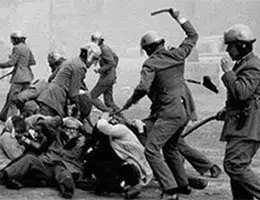 The Latin word laedĕre , which can be translated as “to harm” , derived from laesus . This term came to our language as lesa , an adjective that refers to someone who received damage .
The Latin word laedĕre , which can be translated as “to harm” , derived from laesus . This term came to our language as lesa , an adjective that refers to someone who received damage .
The idea of humanity , on the other hand, refers to the human race or human nature , among other meanings. Humanity, therefore, is formed with the totality of human beings.
With these concepts clear, we can focus on the expression against humanity : this is what describes what hurts or offends all people . A crime against humanity , in this way, is an attack on human dignity that violates the fundamental principles of international law .
Extermination , forced disappearance , slavery and torture are considered crimes against humanity due to their inhuman nature when these actions harm mental or physical integrity or cause the elimination of a large number of people.
The Rome Statute , which is international in nature, identifies the following eleven acts as constituting a crime against humanity:
*murder : a homicide carried out with intent;
* extermination : the imposition of certain conditions that prevent the survival of a group of people;
* slavery : treating a person as a material asset , as a resource;
* deportation : expelling a person from an area in which he or she is lawfully present without authorization under international law;
* imprisonment : depriving a person of their physical freedom, violating norms of law that are considered fundamental;
* torture : subjection of another individual to pain and suffering, both physical and mental. This section includes medical experiments carried out on human beings against their will ;
* rape : any sexual act that forces the victim to do something against their will, leaving them with physical and mental consequences, or even leading to death;
* persecution : the deprivation of fundamental rights for ideological reasons of a group or community;
* forced disappearance : kidnapping or detention of a person and subsequent concealment of evidence of the crime;
* crime of apartheid : acts of oppression and domination by one race against another;
* other intentional acts : whenever they cause great suffering or threaten the integrity or health of the victim.
 The International Criminal Court understands that, for a crime to be considered against humanity, it must be a systematic or widespread attack against civil society : that is, with multiple victims . These acts represent an affront to humanity as a whole.
The International Criminal Court understands that, for a crime to be considered against humanity, it must be a systematic or widespread attack against civil society : that is, with multiple victims . These acts represent an affront to humanity as a whole.
It is important to keep in mind that, due to their severity, crimes against humanity are imprescriptible . In this way, there is no deadline that marks the end of the persecution , but those responsible can be tried at any time, regardless of the number of years that have passed since the events. On the other hand, the authors of crimes against humanity are not only those who have materially executed them, but also their promoters and those who have made their development possible.
All other types of crimes are subject to prescription , the legal institute that establishes criminal law so that it is possible to extinguish the persecution of criminals due to the passage of time.
The United Nations has an agency called the Office of the High Commissioner for Human Rights ( OHCHR ) and specializes in the promotion and protection of human rights at the international level. In 1991, he developed the first version of the so-called Minnesota Protocol for the investigation of crimes against humanity.
The main objective of the Minnesota Protocol is illegal executions , very common in cases of this type before State officials had any type of supervision to prevent them from influencing or acting in criminal investigations. As recommended by the protocol, independent investigative commissions began to be formed with all the necessary powers to proceed before making such a drastic decision.
